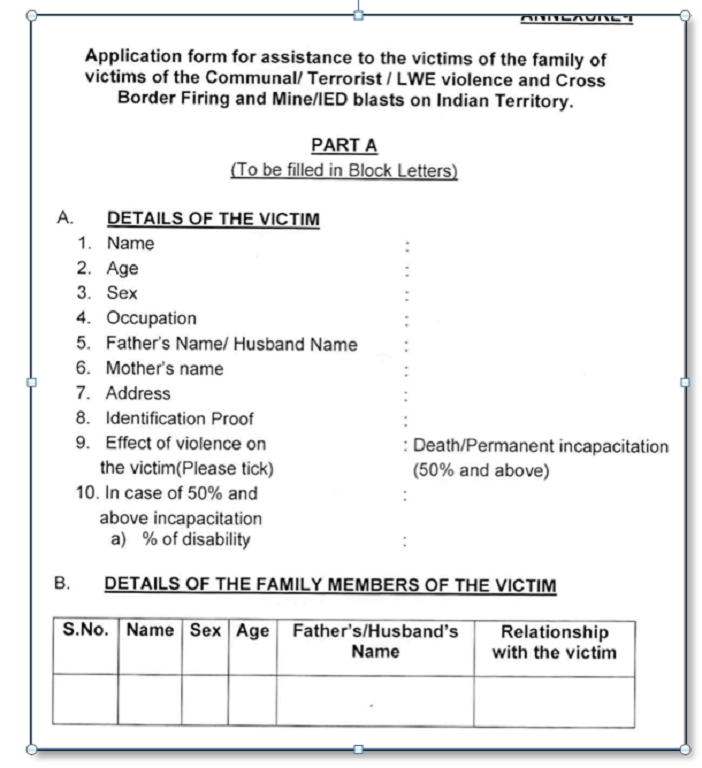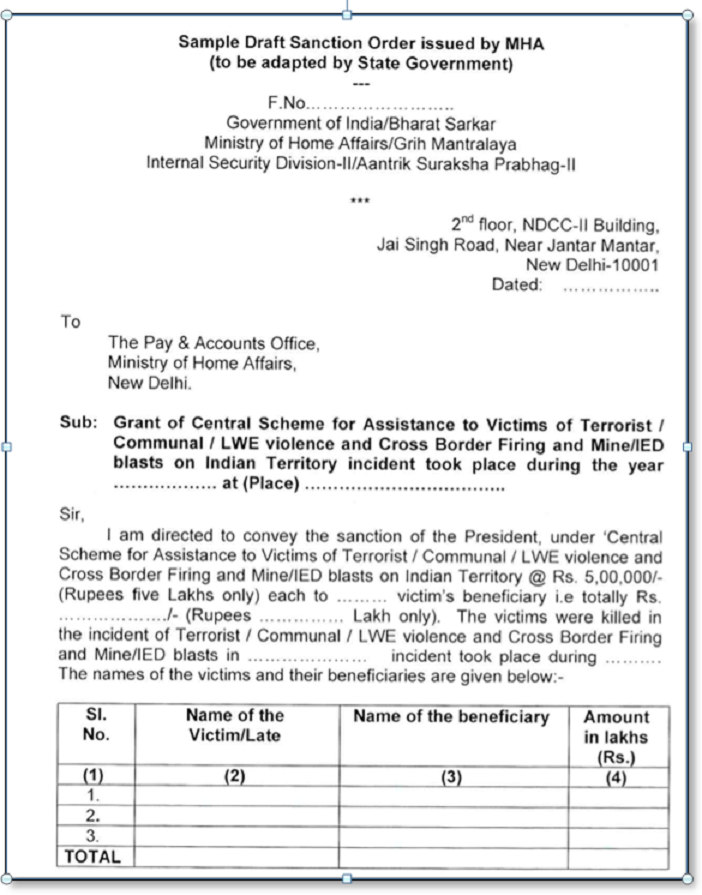[orc]The MHA has increased the financial assistance under the scheme for assistance to civilian victims of terrorist/communal/LWE and other violence to Rs 5 lakh. Those killed in cross border firing and Mine/IED blasts are also eligible to receive assistance under this scheme.
The Ministry of Home Affair (MHA) has recently issued revised guidelines of the ‘Central Scheme for assistance to Civilian Victims/Family of Victims of Terrorist/Communal/LWE violence and Cross border firing and Mine/IED blasts on Indian territory’. The assistance amount under this scheme has now been increased to Rs 5 lakh from the earlier Rs 3 lakh for non SRE states.
What all incidents does this scheme cover?
The initial guidelines of this scheme were issued in 2008. Those guidelines only covered the victims of Terrorist/Communal/Naxal violence. The revised guidelines now replace Naxal violence with Left Wing Extremism (LWE) violence. It has to be noted that the definition of the LWE violence has remained the same as the Naxal violence even in the revised guidelines.

The only other change in the revised guidelines is the inclusion of victims of both Cross Border Firing & Mine/IED blast incidents. In the guidelines, Communal violence is defined as planned and organized acts of violence by members of one community against member of another community. Terrorism violence also includes militancy and insurgency related violence.
Who is eligible to receive Assistance under this scheme?
The scheme is applicable in cases where the victim has lost his/her life or is permanently incapacitated (defined as 50% or above). In the event of death or permanent incapacitation, the surviving spouse would be extended the financial assistance. If both the husband and wife die in the same incident of violence, the family members would be entitled to the assistance.
The assistance would be extended under this scheme even if the victims have received ex-gratia or any other financial assistance from any government except under this scheme. Even the Next of Kin (NoK) of government employees would also be eligible to receive the assistance. Foreign nationals are also covered under the scheme while the perpetrators of violence or their family will not be entitled to any assistance. It has to be noted that there is no income criteria to be eligible under this scheme.
What is assistance offered?
The assistance under this scheme includes the following
- Financial Assistance of Rs 5 lakh: The financial assistance of Rs 5 lakh would be put in a fixed deposit in the name of eligible spouse or family members. This account would have a minimum lock in period of 3 years or till the elder child attains a majority in case of minor children in the family. The interest on the above sum would be credited quarterly to the beneficiary’s account. At the end of the lock in period, the principle amount would also be transferred to the beneficiary. The NoK of the beneficiary would receive these benefits in case of the death of the beneficiary. The amount has been enhanced to Rs 5 lakh from the existing Rs 3 lakh to non SRE states.
- Health Card: Those permanently incapacitated and members of the family of the victim would be given a Health Card by the District Health Society under the NRHM. This card would entitle them to free medical treatment for injuries due to violence or any other major illness. Medical care would also be extended to the victims under the existing schemes of the government like the Rashtriya Arogya Nidhi and National Trauma Care Project.
- Assistance under ‘Project Assist’: Children in the family would also be entitled for assistance under the ‘Project Assist’ being implemented by the National Foundation for Communal Harmony of the MHA.
Process of Application
The eligible claimants should file their claims in a prescribed proforma within 3 years of the relevant incident. The time limit could be relaxed in deserving cases. The claim has to be submitted to the District Collector. The claim would then be verified by a district level committee headed by the collector. The committee would look into the relevant police records/FIRs, death and post mortem certificate in the event of death and medical certificate in the case of permanent incapacitation. The medical certificate has to be issued by the District Medical Officer and it should be shown that the victim has suffered more than 50% disability of a permanent nature.

The district committee has to make a recommendation within 15 days of the receipt of the claim. The District Collector can also recommend assistance under this scheme with suitable justification. The processing of the claim has to be completed within 3 weeks including the recommendation of the committee. If the claim is approved, the District Collector issues the sanction order on behalf of the state government. While issuing the cheque or crediting the amount, the Collector must give standing instruction to the bank that no premature withdrawal of this amount is allowed. The assistance released by the states will be reimbursed by the MHA on a half-yearly basis.


